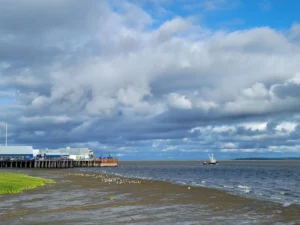Reporter Kirsten Dobroth has been covering Peter Pan for Undercurrent News. She spoke with KDLG’s Meg Duff about this summer’s developments.
Meg Duff: Peter Pan Seafoods was a fixture in Bristol Bay for decades, but last year, the company ran out of money and could no longer pay its debts. It didn’t go bankrupt, exactly; instead, it was put into receivership. Can you explain what happened?
Kirsten Dobroth: Right. So, bankruptcy is typically a voluntary legal process where a company in financial trouble would seek out protection from collections. In this case, Wells Fargo, which is Peter Pan’s major lender, petitioned a court in King County, Washington back in April to place the company in a receivership, which is a way for creditors to recover debt. Another difference is that a receivership is involuntary and allows a court to appoint a neutral party to sell off assets and pay back that debt.
Duff: Okay got it, and that request from Wells Fargo was granted by the court back in April.
Dobroth: Yeah, exactly. Wells Fargo said in its request that Peter Pan had missed payroll and owed tens of millions of dollars, and the court appointed a fiduciary group based in California to be the receiver.
Duff: Peter Pan’s King Cove processing facility is now closed, and Silver Bay is running its Dillingham facility and its Port Moller facility. But Silver Bay doesn’t actually own those facilities. Not yet anyway. What’s going on there?
Dobroth: Well, exactly that so far. Before this all happened, Silver Bay said that its plans for this summer in Dillingham and Port Moller were part of its long term restructuring plan. Since then, Silver Bay has reiterated that it intends to work with Peter Pan’s court appointed receiver on any long term plans for the facilities. But there hasn’t been a lot of news, at least as far as acquisitions from Peter Pan, outside of that.
Duff: This summer, while folks in Bristol Bay have been busy fishing, Silver Bay put in a bid. Then Peter Pan owner Rodger May swooped in to counter bid. Tell us the story of that bidding war.
Dobroth: I think it’s important to get out in front and say anything we know about these bids are coming from claims made by Peter Pan’s co-owner Rodger May in court documents. So there’s not really a paper trail to look at and say this person offered this much for this processing plant. That being said, Rodger May has argued – again, in court filings – that the process hasn’t fairly estimated the worth of some of Peter Pan’s assets. He says in one instance he learned of a bid from Silver Bay for some of those assets and put in his own offer, which wasn’t accepted. I guess one of the more concrete things I can say is that in the last week, Rodger May asked the court to approve his request to purchase eight Peter Pan assets, including the Port Moller processing facility and the fuel business in King Cove.
Duff: Oh interesting! So May is still trying to get some of Peter Pan’s assets back, but it’s not really clear if he is trying to get everything back.
Dobroth: Right.
Duff: In addition to claiming that Silver Bay had an unfair advantage, May also claimed that Peter Pan owed him money. What did the court say about those claims?
Dobroth: Yeah, again in court filings, Rodger May has argued that he and his wife are also Peter Pan creditors and owed about $40 million. He has also claimed that Silver Bay hired away Peter Pan executives as a way to buy up some of the company’s assets, which Silver Bay very quickly said was not true. The court won’t necessarily rule on all these individual things. But it did amend the receivership order recently upon his request to allow for more time and transparency for the sale of the company’s assets, which he had argued would benefit junior creditors – so people who are owed money other than Wells Fargo.
Duff: So now May can bid on any of Peter Pan’s assets. And so can anyone else. Do we know yet who will wind up running these facilities after the season ends, or is it still anyone’s guess?
Dobroth: Yeah, there’s been some rumors as far as the facilities that are up for sale, but nothing’s been announced. There’s also assets that aren’t real tangible property, like fisheries quota, so it’s hard to say who will end up with what when all is said and done.
Duff: Thanks Kirsten!

